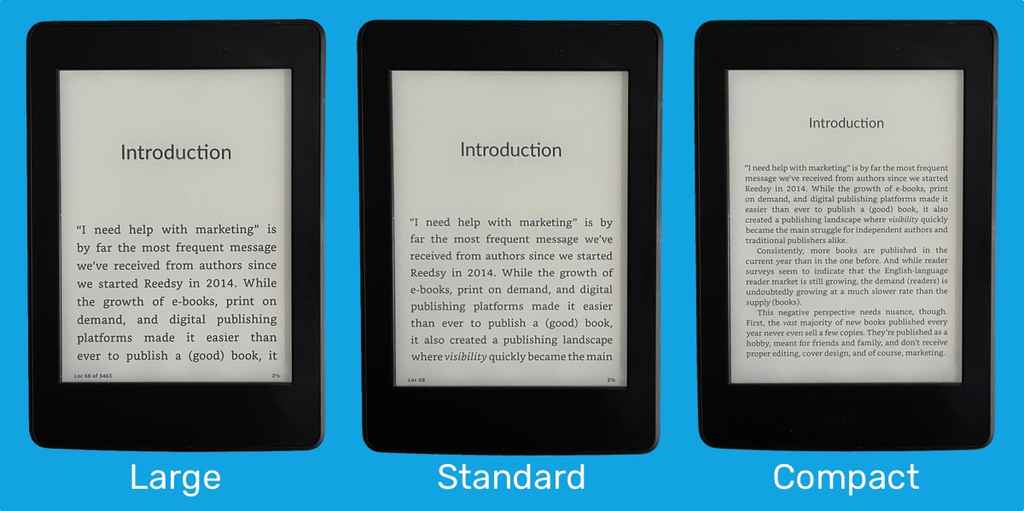Guides • Understanding Publishing
Last updated on Oct 15, 2025
What is an Ebook? The Magic of the Electronic Book
Martin Cavannagh
Head of Content at Reedsy, Martin has spent over eight years helping writers turn their ambitions into reality. As a voice in the indie publishing space, he has written for a number of outlets and spoken at conferences, including the 2024 Writers Summit at the London Book Fair.
View profile →When is a book not a book? When it’s an ebook, of course! An ebook, short for electronic book, is a computerized version of a traditional print book. This invention was followed by a digital publishing boom, allowing readers to instantly buy and read books on a computer, tablet, smartphone, or (more recently) an e-reader.
In this post, we’ll dive into some of the most popular ebook formats and reveal the reasons why (almost) every author should consider joining the digital publishing revolution.
A one-size-fits-all file format
Where once, most ebook publishers had to manage two types of ebook file format, that is now a problem of the past. Amazon has recently announced that it's no longer supporting its long-service formats, the MOBI and AZN. Instead, Kindle devices will default to the industry-standard EPUB format. Long live the EPUB!
Popular Ebook Readers
Some of the most popular e-readers on the market include:
- Kobo Clara HD ($119.99)
- Kobo Forma ($249.99)
- NOOK GlowLight Plus ($199.99)
- Kindle Paperwhite 8GB ($149.99)
- Kindle Oasis 8GB ($249.99)
Now that you're familiar with the nature of ebooks, let's get to the juicy stuff.
Why (almost) every author needs to publish ebooks
So, why is publishing an ebook such a no-brainer for most authors?
Firstly, we now live in a digital world: in 2007, the first Kindle changed the way millions of readers bought and read books, and ebooks are only going to continue to grow in popularity in the future.
Secondly, it will likely make life easier for you as an indie author! Ebooks allow indie authors to reach a wide audience and make a living as writers. In fact, for most authors publishing today, it would be unthinkable to have a print-only distribution plan. Let's take a closer look at the benefits of publishing ebooks for authors everywhere.
They're great for accessibility
A great thing about ebooks is how customizable they are: you can adjust everything from font and font size to the background color. Readers with visual impairment issues can now access almost any book and make it 'large print'.

The technology that makes it possible for ebooks to fit every device and meet every reader's need called "reflowable text" — which means that there’s no fixed font size and position. To help his clients better understand this concept, book designer Alan Barnett describes ebooks as "one long, scrolling text chain that gets split at the bottom of the screen (not the page)."
They’re cheap to make and easy to sell
Ebooks don’t take paper, ink, and glue to create. They don’t need to be stored in a warehouse and shipped across the country in a semi-truck. As a result, the overhead costs are almost negligible, resulting in a lower price point for readers and a much larger chunk of royalties for authors.
You can instantly reach a massive audience
In the good ol’ days, it would’ve been a Herculean task to get an indie book stocked in bookshops across the country — and nearly impossible to sell worldwide. But with the digital distribution of ebooks, any writer can almost instantly reach readers across the globe without ever leaving their home.
Digital publishing isn't just for aspiring bestsellers! Many professionals leverage the low cost and flexibility of ebooks to broaden their network. Find out more in this post on writing an ebook for your business.
You can quickly format them yourself, for free
Unless you’ve written one of those design-heavy books that require a fixed-layout format, ebooks are pretty easy to format by yourself. Using a free app like Reedsy Studio, you can lay out your ebooks as you write them — meaning that as soon as you’ve polished off your last edits, you can instantly export an EPUB and upload it to digital retailers within minutes.
And… if you need an extra incentive to try Reedsy Studio, it also flawlessly exports print-ready PDFs that you can use to churn out perfectly formatted paperbacks.
What are the downsides of publishing ebooks?
To be honest, there aren’t a lot of reasons to avoid publishing ebooks altogether. Unless you're publishing a text that will require a lot of visual control over your title (such as an academic textbook or a photography book), you're a natural candidate for the ebook format.

(George Daniels: A Master Watchmaker & his Art. Designed by Adam Hay.)
Of course, authors who are publishing a book with advanced typography and layout needs may be better off sticking to print simply because the limitations of reflowable text would make the design of your book more complicated.
Then there’s the romance element: the idea of readers holding your book is certainly alluring. However, there are also cost-effective ways for any indie author to sell print versions, so any of your readers who enjoy cracking the spine on a fresh paperback can still relish that experience.

Give your book a professional look
Some of the most experienced book designers in the world are right here on Reedsy. Sign up and meet them today.
Learn how Reedsy can help you craft a beautiful book.
Now that you’ve seen how publishing has been transformed into a dream that any writer can achieve, you might be wondering how to get started yourself. We recommend checking out the other posts in our series on ebooks:
- How to Write an Ebook (as a promotional tool). Read it here.
- How to Publish an Ebook. Learn all about it.
- Ebook Distribution: The Complete Guide for New Authors. Here it is.
- How to Market an Ebook on a $10 budget. Learn it here.
So go forth and spread the word! Show the world what you have to offer and get your stories into their hands through the wonderful, convenient, affordable medium of ebooks.
In the next part of this guide, we'll take a look at how you can write a non-fiction ebook to use as a promotional tool.


